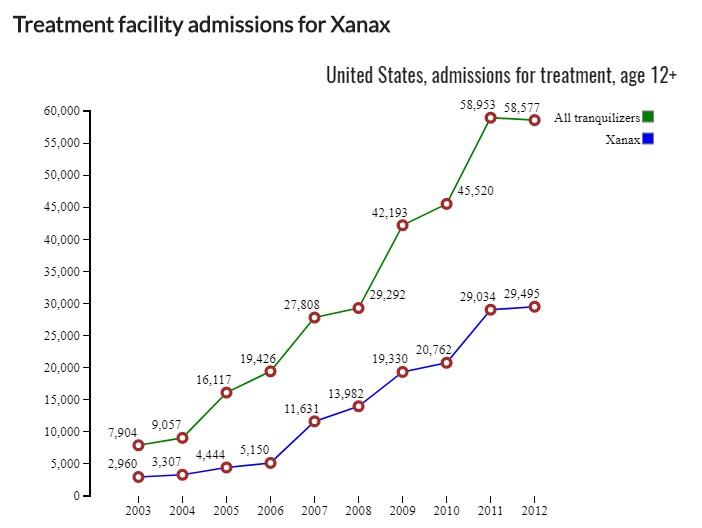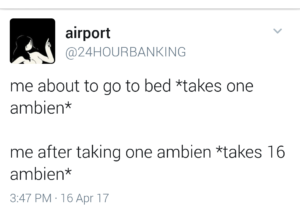“A rose by any other name would smell as sweet,” Juliet proclaimed. However, if Juliet had been born today she might have said, “Xanax by any other name is still Xanax.” This concept, unfortunately, seems to elude legislators, the media and medical professionals alike. All the buzz these days seems to be about Xanax (alprazolam). Haven’t you heard about all the college students abusing Xanax? Isn’t it terrible how often Xanax is involved in all those overdose deaths? Some places are even taking legislative action against Xanax. In Alabama, for instance, the board of Medical Examiners has requested to have Xanax changed from a Schedule IV controlled substance to a Schedule II, alongside such substances as Morphine, Fentanyl and Adderall.
Why does Xanax get all the glory? Is it because Xanax is more dangerous and addictive than its fellow benzodiazepines Ativan (lorazepam), Klonopin (clonazepam), Valium (diazepam), etc? There doesn’t seem to be any scientific evidence to support the idea. Perhaps it’s simply because Xanax is prescribed more frequently than its lesser known counterparts. This may be due in part to doctor preference or due to the short half life of Xanax which requires more frequent dosing. It could also be due to the celebrity of the drug itself. I challenge you to watch the latest blockbuster film or reality TV show without hearing some reference to Xanax or “Xannies.” Even daytime TV darling Kelly Ripa glibly announced that she took “half a Xanax” to help her deliver her acceptance speech at the GLAAD Awards, a statement which was was met with raucous applause by the audience.
While any effort to generate awareness and potentially curb the benzodiazepine epidemic is commendable, we have to ask ourselves, is Xanax just the scapegoat in this situation? Will legislative action and media attention for only one benzodiazepine out of so many make any difference?
If we look at the history of this problem, we see that the answer to that question is a resounding “NO.” Remember Valium? “Mother’s little helper” (as it was endearingly termed by the Rolling Stones) was once the most prescribed drug in the US with more than 2.3 billion pills sold per year at its zenith. All of a sudden there was a Valium epidemic and the public was both frightened and angry. In comes Pfizer (along with other manufacturers) to save the day and provide us with safer, shorter-acting benzodiazepines that were less addicting, like Xanax! Today we are shocked to discover that Xanax is every bit as bad as the disgraced Valium. Not to worry: Klonopin, Ativan and the others will still be there to pick up the slack… and so the merry goes round and round.
Klonopin and Ativan do not have the same reputation as Xanax and Valium, but they are no less destructive. Tens of thousands of people in the US seek treatment for tranquilizer withdrawal every year. However, only about half of them are there because of Xanax.

Most people have heard of Xanax but have no idea what a benzodiazepine is, or that they might currently be taking one. This lack of awareness means that patients who are prescribed Restoril (temazepam) for insomnia, Klonopin for anxiety or Ativan for restless leg syndrome are often unaware that they are taking a potentially dangerous and addictive substance that is only meant for short-term use, approximately 2-4 weeks. It’s easy to see how this can turn many people into accidental addicts.
It’s not just about addiction though. People can die if they suddenly stop taking benzodiazepines, even when they are taken as prescribed by a doctor. Let’s get something straight once and for all: while you can die from overdosing on opiates, death is not a side effect of opiate withdrawal. Benzodiazepines, on the other hand, have that listed right on the package insert. Benzodiazepines are unlikely to kill you if you take too many, however, if you suddenly stop taking one or let your prescription run out before you can get a refill, your life could be in danger. Jesse Jacobs, Marshal Carman, John Patrick Walter, Gregory Lee Hill, Tyler Tabor, Sean Levert all died in jail after being denied their prescriptions for Klonopin and Xanax. Some of these men were booked for things like unpaid parking tickets or were only serving a sentence of a few weeks. Where is the media outcry? The Twitter storms? Are doctors warning patients that their anti-anxiety/antidepressant medication could potentially be a life sentence?
Then there are the other potential life-threatening and life-altering problems related to benzodiazepine use. How many women are aware that their Ativan is teratogenic and can cause miscarriage and birth defects in the first 8 weeks, before they even realize they are pregnant and can get safely off? Studies have shown that long-term benzodiazepine use can also lead to increased infections, car accidents, and Alzheimer’s, as well as diabetes, cancer, suicide, and the list goes on and on. This is a problem that goes well beyond addiction and it’s not exclusive to Xanax.
If there is going to be any hope of reducing the potentially hundreds of thousands1 of benzodiazepine-related deaths every year then we have to look at the entire class of benzodiazepine drugs just as we do opiates. It would almost seem ridiculous for legislators to put forward a bill to address the “codeine epidemic.” It’s every bit as silly to focus our attention only on Xanax.
When actor Heath Ledger died, two opiates and three benzodiazepines were found in his system, including Valium, Restoril and Xanax. While this may seem excessive, it is not uncommon for people (including many celebrities who have died) to be prescribed multiple different benzodiazepines along with opiates for different problems such as insomnia, pain and anxiety. Deaths like this are why the FDA recently issued a black box warning against combining opiates and benzodiazepines. But what is being done about the irresponsible and off-label prescribing that continues to flood benzodiazepines into our homes and onto the streets?
Even with increased warnings, benzodiazepine prescriptions continue to steadily increase year after year. The current focus by the medical community, media and legislators on Xanax will not create the kind of change that is needed to change the course of the benzodiazepine epidemic. If social media is an indication of anything, it’s that Xanax can more than easily be replaced by:
Ativan:


Klonopin:


Or even the Z-drug Ambien (similar to benzodiazepines):

We need to stop pretending that what we have is a Xanax problem. I get it, it’s convenient to have a scapegoat. It means we can shift the blame from ourselves onto something else. Nobody wants to consider that the most popular and profitable drugs on the market today are part of a silent epidemic that affects anywhere between 3 and 16 million Americans every year. Maybe we’re afraid to shine a light on the benzo problem until the next class of wonder drugs has come out to take their place. After all, benzodiazepines are considered to be more dangerous and difficult to withdraw from than heroin. Who has time for that? Perhaps doctors are reticent to admit that 40-90% of the time benzodiazepine prescriptions are written there is no clear medical reason for doing so.2 Whatever the reason, if the Valium epidemic taught us anything, it’s that Xanax is not the answer to our problem.















Jocelyn…thank you…
benzo brains is helpful…
I was a patient that took valium 5 mg twice a day for years…
I started taking this benzo after my first panic attack…
the benzos are a big problem…
but I also worry about the use of abilify instead of a benzo for non-psychotic use..
the anti-psychotics are also a big problem…
thanks again for your help..
Report comment
I agree, abilify and other atypical anti psychotics are particularly worrisome when used for insomnia and other off label purposes. Many people don’t even realize what they’re are taking and that the research has shown these can cause brain damage. Like benzos, they may be life saving in extreme circumstances. But to prescribe them as a daily treatment long term is dangerous in my opinion .
Report comment
Think of the benzos as a band of gangsters and the banning of individual ones the equivalent of being on the FBI’s 10 most wanted list, that you usually don’t make until you become exceptionally notorious, even though you’re just one of the crowd of habitual criminals.
Report comment
https://psychiatricsurvivors.wordpress.com/2017/06/29/mothers-little-helper/
Report comment
Remember Halcion? Banned in the U.K. I had a bad experience with this one 20 years ago. Only took it 7 days but had horrifying withdrawal symptoms. Very Good article.
Report comment
Halcion – sounds blissful! No wonder it was the “The most popular and profitable sedative hypnotic in the world” in 1991. http://www.benzo.org.uk/halcion.htm
I looked into the story behind it, here’s what I found.
The BBC broadcast a Panorama documentary “The Halcion Nightmare” in Oct 1991. British regulators suspended its licence. The drug company Upjohn fought back with libel action against the BBC and the Scottish psychiatrist Prof Ian Oswald…
From Newsweek 1994…
“When Oswald showed up on the front page of The New York Times on Jan. 20 describing the Halcion affair as “one long fraud”-Upjohn’s lawyers were ready to pounce. Within days they filed a libel suit in Britain, seeking unspecified damages and an injunction against further charges.”
http://www.newsweek.com/more-halcion-headaches-186098
The Pharmaletter reported…
“Some of the most serious allegations against Upjohn involved Protocol 321, a clinical trial conducted in the early 1970s, and the judge ruled that omissions of data “were not made intentionally and dishonestly…” by Upjohn, as Prof Oswald had alleged. He said that Upjohn’s key witnesses were “honest people who gave honest evidence.”
The BBC said it would appeal against the ruling, and said the decision was “a blow to investigative journalism.”
And finally…
“Upjohn has admitted to making “human errors,” but company president and chief operating officer Ley Smith said “this is a resounding victory for the people who rely on Upjohn’s products.” The company has said it will donate its damage awards to two international charities, Save the Children and Help the Aged.”
https://www.thepharmaletter.com/article/upjohn-wins-uk-halcion-libel-case
Report comment
Shorter half life = quick onset, quick OFFSET and rebound anxiety = need more. Alprazolam is thus the “crack cocaine of the benzo world” – only surpassed by Triazolam (Halcion – see above). Plus it is extraordinarily high potency (see Ashton manual) Also the shorter half life ones “feel nicer” which is itself naturally a higher risk. None of this means that diazepam (longer half-life, comes in much lower dosages, feels relatively unpleasant) is without significant risk, because of course it is, but overall diazepam IF used very cautiously and very sparingly is a significantly safer drug than alprazolam. Nevertheless overall this article is very well written and accurately highlights a very problematic area.
Report comment
Jocelyn
Great blog that challenges the Establishment’s on going efforts to avoid any thorough going exposure of the worldwide benzodiazepine crisis. The focus on Xanax is a way to misdirect people away from the pervasive corruption that permeates Psychiatry, Big Pharma, and organized medicine when it comes to the prolific prescribing of all psychiatric drugs; benzos are clearly some of THE most harmful and deadly.
If the depths of this crisis (involving the harm caused by ALL benzos) were truly understood by the general public, it would be extremely threatening to these particular major medical institutions. The business of “treating” anxiety and depression in our society – two of the biggest “symptoms” of an overall System that is truly sick and dying, is both necessary and highly profitable.
Unfortunately, only the very rich and famous celebrities get all the publicity when it comes to some of the harm caused by benzos and other drugs, BUT even in these very public overdose deaths the true role of benzos is still very much hidden from the public. Please check out my blog from last year titled “Who and What Killed Prince and Michael Jackson: Will the Role of Benzos Ever Be Revealed.”
https://www.madinamerica.com/2016/08/what-killed-prince-and-michael-jackson-will-the-role-of-benzos-ever-be-revealed/
Jocelyn, keep writing on this issue. And your YOU TUBE videos are very powerful and a life savior to many people.
Richard
Report comment
Thank you Richard and I remember your article and being so frustrated at how covered up benzos are in these celebrity deaths
Report comment
I agree with the writer; we need to look at all the benzos and not just Xanax. All of these damned things are harmful and I wouldn’t even take one for a short time. I’ve watched people take these things in large amounts for recreational use and then have to put up with all their behaviors that resulted from such use. They do all kinds of irrational things that result in problems because the use of these things in large amounts does away with your inhibitions. They are sold on the street or are traded and swapped for other drugs. And the behavior lasts, not just for one day, it can go on for three and four days at a time.
So, benzos are not only a danger to people because doctors hand them out like candy, they cause real behavior problems with people who are using them recreationally and who are literally “out of their minds” while under the effects of taking large doses.
Report comment
Okay anonymous case study.
Someone with a drinking problem self-injured, took too much Zoloft and ended up in Psych Ward. There, was referred to “dual diagnosis” where the first thing they did was rip said person OFF benzo (Ativan) cold turkey because now that s/he is “dual diagnosis” no addictive drugs will be supplied.
I guess this is happening a lot in the USA? How to help? This person is poor & without resources – all medical care etc is provided by Medicaid. Person is already sick from decades of Seroquel and antidepressants, but is too afraid – and too dependant upon “system” – to find a way out.
This is draconian, and negligent medical practice. But s/he doesn’t have options in the medicaid system. Housing, food, also under threat from government policy.
Just die young? Is that the answer?
Report comment
I’m surprised the treatment facilities are actually honestly reporting “admissions for Xanax.” I never found one mainstream or psychiatric practicer who admitted to the common adverse and withdrawal effects of the antidepressants and antipsychotics. Instead they claimed admittance to a hospital was for other fictional reasons, in my case for a non-existent “chronic airway obstruction,” which magically turned into “bipolar.” In other words, blame the patient, not the drugs.
Although, my admitting doctor was eventually arrested because he was having lots of patients medically unnecessarily shipped long distances to himself, “snowing” people, then performing unneeded tracheotomies on them for profit.
At least with the benzos the doctors are starting to admit to the fact they’re dangerous. While the medical community is still pushing the antidepressants on any woman who walks into a hospital for any reason. The doctors do shut up quickly and get really embarrassed when you mention you’re allergic to drugs that cause anticholinergic toxidrome, however.
Report comment
This is a frustrating situation for anyone who has been thru “treatment” to witness. So much time and money is being wasted on dehumanizing, degrading, often dangerous “treatment,” while actual solutions to what ails humans today are regarded as “anti-science” or (God forbid…) “anti-psychiatry,” which I suppose is the modern day equivalent of blasphemy.
Xanax can be more problematic than some other benzodiazepines, sometimes, in some people. Problem there? All benzodiazepines can be dangerous, especially since they’re only safe when used for short periods of time, in limited situations, in some people.
Honestly, I think one reason so many “experts” are gunning for xanax is because it make some people feel good, for a whlie, plus…there are plenty of other equally dangerous, somewhat less fun pills out there that can do the same thing (“appropriate medical treatment for severe anxiety”). Kind of like…back in the day, Seconal was demonized, then Quaaludes. Quaaludes, of course, have been banned in the US since the mid-80s. Seconal, for whatever reason, has made a comeback recently.
On and on it goes. It wouldn’t surprise me if Xanax ends up being moved to Schedule II or III in the federal, DEA classification system…once a new, “safe” drug pops up. Benzodiazepines exploded once the barbiturates were demonized. The “atypicals” hit it big time once psychiatrists became honest about how terrible the tranquilizers often were/are, especially the high dose Haldol so popular for way too long.
As things are going now, its total mind-fuckery. Xanax is being singled out, but our friendly media will, of course, have “experts” telling us that benzodiazepines are “safe and effective, when taken as prescribed…” just not that horrible, awful, no good, very bad, demon pill, Xanax. My wild guess is that overall benzodiazepine prescribing rates won’t even drop all that much, if at all…and, before too long, Big Pharma will rescue us all with a shiny new pill (and then several shinier, newer, “me-too” pills, also) that will soothe the afflicted, safely. You know…a real “medicine,” not a “drug” like that satanic pill, xanax.
Maybe Szasz was right? Psychiatry needs to be abolished, for the good of humanity….
Report comment
this will not stop until a popular campaign using direct action emerges
Report comment
The carnage needs to stop.
The toll is huge.
Report comment
Wow – I’m reading this 7 years after this article was published. I wish I had seen it sooner and I wish I was never prescribed xanax….40 years ago. Now, in 2024 I’m dealing with the worst form of protracted withdrawal and wondering if it will ever stop. This is worse than any anxiety attack I have ever had.
Report comment